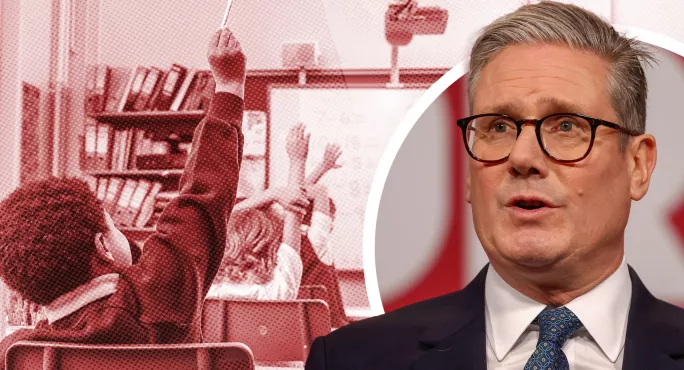The prime minister Sir Keir Starmer has committed to giving children “the best start in life” and ensuring a record proportion of five-year-olds start school “ready to learn”.
While he did not go into details, Sir Keir’s latest announcement would seem to reiterate a pledge he made in opposition in July last year to get half a million more children to hit early learning goals (ELGs) by 2030.
Today’s plan aims to get “a record 75 per cent of five-year-olds in England ready to learn when they start school”.
PM sets out ‘measurable milestones’
Sir Keir made the promise as he laid out his “plan for change” with six new “measurable milestones” - the others do not directly relate to education - at Pinewood Studios in Buckinghamshire this morning.
In a speech that was heavy on aspirations but short on detail, Sir Keir said the milestones would enable the public to measure his government’s progress, help “drive delivery and drive change” and allow the public to “hold our feet to the fire”.
Sir Keir spoke of the “almighty challenges” faced by the country, with “one in three children not ready for school at the age of five” and “kids in Reception, who aren’t starting to read…they’re struggling to speak”.
Taking questions afterwards, Sir Keir said his government was committed to “dealing with and driving down child poverty”, but that change would take time as “the failures of the last government were more profound and deep than we thought”.
“We have set up a task force to tackle child poverty, looking at housing, health and education. There is not one silver bullet; we have a strategy we are working on,” he told reporters.
The 17 ELGs were rolled out in 2019 and are designed to assess pupils’ achievements at the end of the Reception year - the last year of the early years foundation stage (EYFS) - covering areas such as being able to count to 20, read simple sentences and take turns when playing. To reach a “good level of development”, children must have reached the ELG in 12 of the 17 areas in which they are assessed.
The progress of children up to the age of five is measured by early learning goals. Data published in 2022 showed that 65.2 per cent of pupils were considered to be at a good level of development at the end of EYFS.
‘One of nearest things to a silver bullet’
Paul Whiteman, general secretary of the school leaders’ union NAHT, welcomed the “strong focus on the early years” and on ensuring more children are ready for school.
He described early, high-quality support for children as “one of the nearest things we have to a silver bullet when it comes to education policy”, adding that cuts to support services over the past decade had had “a devastating effect”.
Mr Whiteman said: “School leaders are seeing an increasing number of children arrive at school with speech and language delays.”
He called for investment in speech and language therapy to ensure every child gets specialist support as early as possible.
Pepe Di’Iasio, general secretary of the Association of School and College Leaders, said: “The number of children who are starting school without basic life skills is a real concern and we are pleased the prime minister has highlighted this issue.
“The evidence is clear that gaps in educational attainment begin early in life and then continue to widen, and therefore it is right to put a focus on early years.”
In response to Sir Keir’s speech, Dr Patrick Roach, general secretary of the NASUWT teaching union, said the aim of recruiting 6,500 teachers “would go a long way” towards realising the government’s ambitions for education.
For the latest education news and analysis delivered every weekday morning, sign up for the Tes Daily newsletter




